> Forums > German Times and Conventions > Lesson 14: Prateritum (Past Tense with D) – 2 Irregular Verbs
-
This derste will continue from where we were on Prateritum.
We have previously written that the words Präteritum and Imperfekt mean the same thing, and Präteritum denotes the past tense with -di.
Präteritum meets the past in every sense, except for the past tense.
It is often used in tales, novels or stories.
We used the regular expression and added the regular expressions to the previous one.
now let's see the additions to the irregular verbs and continue with examples.Below is a list of jewels added to irregular verbs for Prateritum.
These jokes are added to the root, not to the infinitive of the verb. The root is 2. stammform.
For example, for the ich pronoun No Jewelry, 2. StamformForm is used as it is.
The root inserts an -e letter between the verb t on the letter d and the suffix.
now see these irregular acts according to all persons, their pictures and their meanings in a picture:
(We offer our thanks to Mikail Akgümüş Hocamız who helped us in preparing the tablet.)Due to the limited space of the forum area you want to see the following table on a more comfortable and separate page click here.
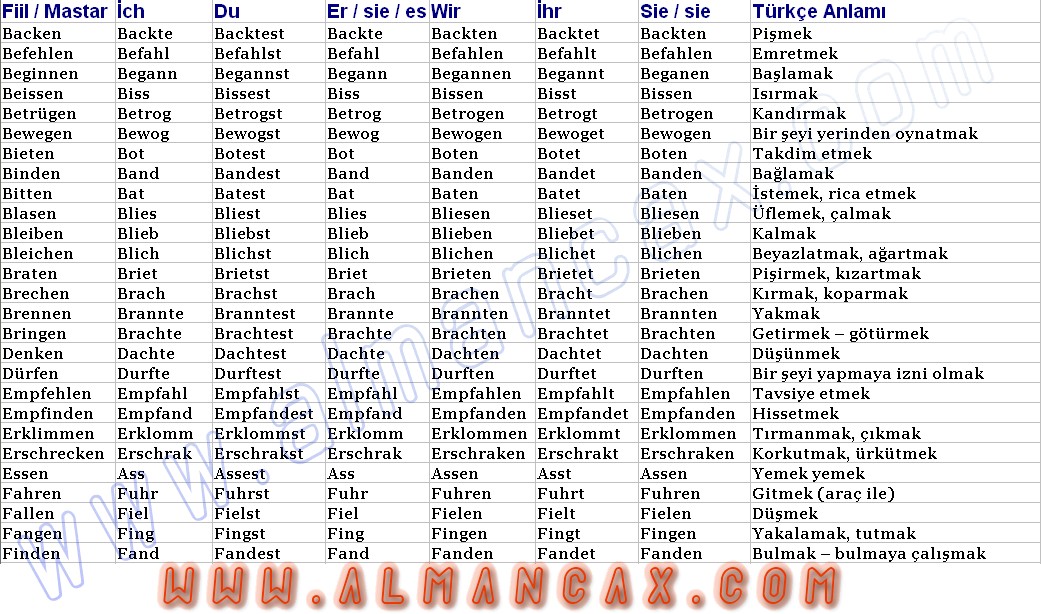
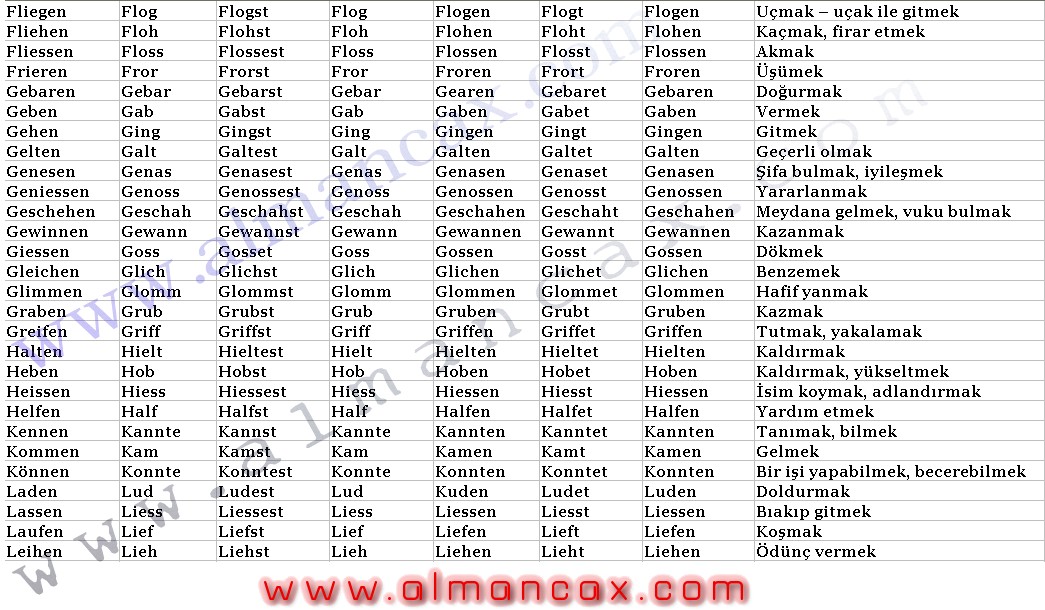
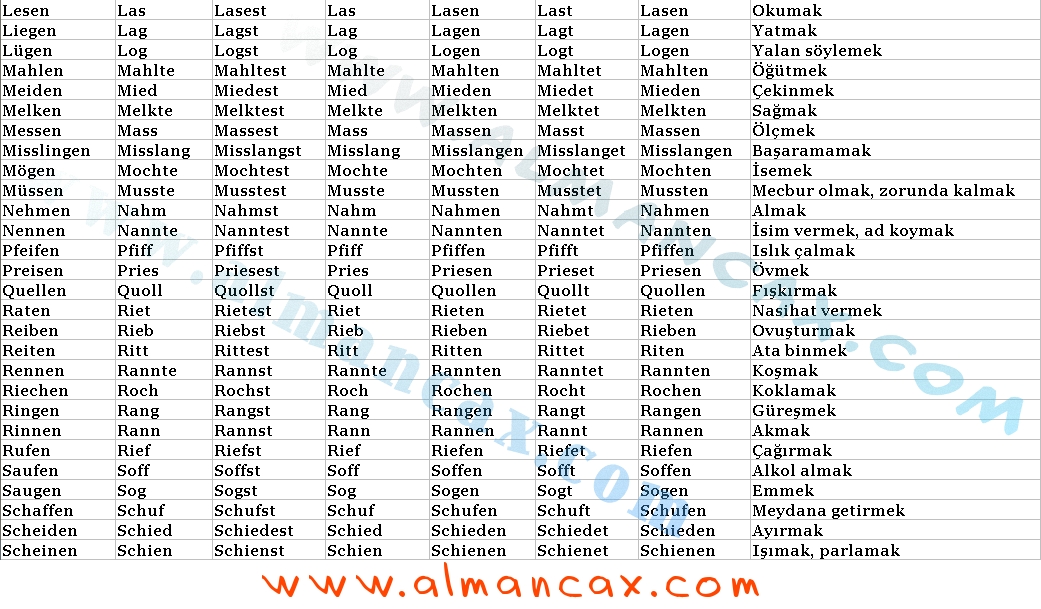
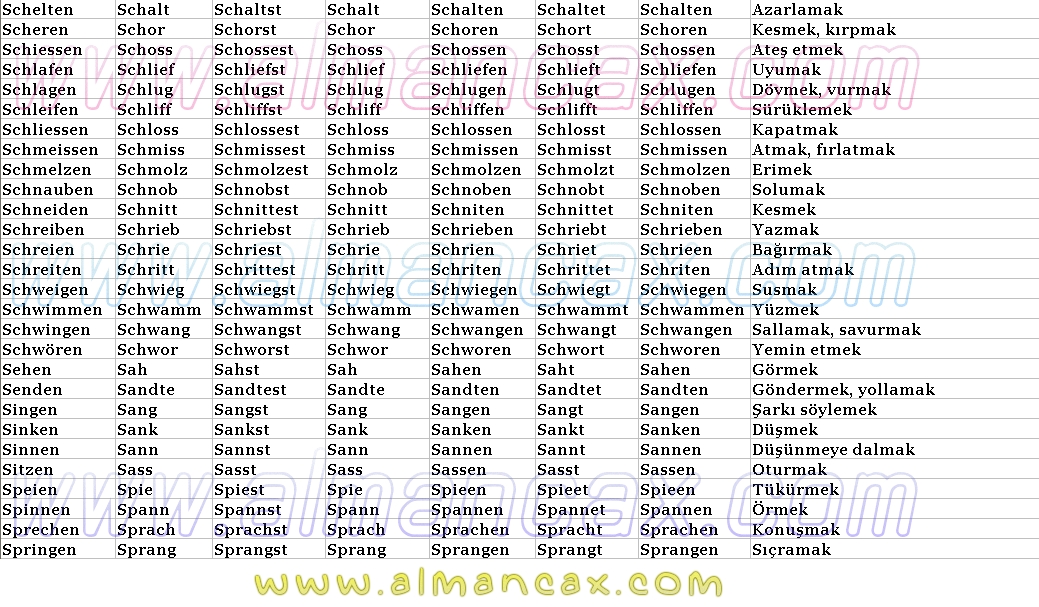
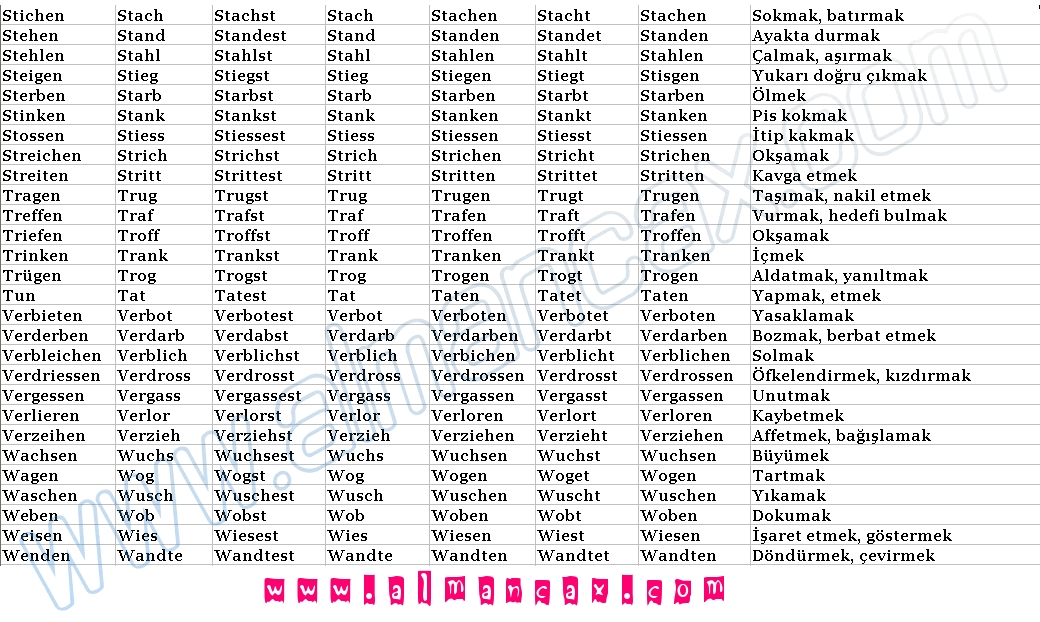

In our previous lessons, we learned how to build the cues.
Now let's give some sample sentences about Präteritum:Du fandest ein Ball (Found a ball)
Fandest du ein Ball? (Did you find a ball?)
Ja, ich fand ein Ball (Yes, I found a ball)
Wir fanden ein Ball (We found a ball)
Ich verkaufte gestern mein Auto (I sold my car yesterday)
Wir gingen gestern ins Kino (We went to the cinema yesterday)
Ich ging gestern ins Kino (I went to the cinema yesterday)
Ich vergass seinen Namen (I forgot his name)
Duplicate your own examples.
In the next section we will examine Perfekt.Thank goodness there is no trouble. On the contrary, it increases the taste of blessing. (Mesnevi)
-
ceremonies emegine health
danke schön, guten tag
how are they memorized. I have to work hard mother cooook
Thank you
This derste will continue from where we were on Prateritum.
We have previously written that the words Präteritum and Imperfekt mean the same thing, and Präteritum denotes the past tense with -di.
Präteritum meets the past in every sense, except for the past tense.
It is often used in tales, novels or stories.
We used the regular expression and added the regular expressions to the previous one.
now let's see the additions to the irregular verbs and continue with examples.Below is a list of jewels added to irregular verbs for Prateritum.
These jokes are added to the root, not to the infinitive of the verb. The root is 2. stammform.
For example, for the ich pronoun No Jewelry, 2. StamformForm is used as it is.
The root inserts an -e letter between the verb t on the letter d and the suffix.
now see these irregular acts according to all persons, their pictures and their meanings in a picture:
(We offer our thanks to Mikail Akgümüş Hocamız who helped us in preparing the tablet.)Due to the limited space of the forum area you want to see the following table on a more comfortable and separate page click here.






In our previous lessons, we learned how to build the cues.
Now let's give some sample sentences about Präteritum:Du fandest ein Ball (Found a ball)
Fandest du ein Ball? (Did you find a ball?)
Ja, ich fand ein Ball (Yes, I found a ball)
Wir fanden ein Ball (We found a ball)
Ich verkaufte gestern mein Auto (I sold my car yesterday)
Wir gingen gestern ins Kino (We went to the cinema yesterday)
Ich ging gestern ins Kino (I went to the cinema yesterday)
Ich vergass seinen Namen (I forgot his name)
Duplicate your own examples.
In the next section we will examine Perfekt.alles gut aber wer lernt obene auswendig.
alle gemischt
How do you make these inflections? I'm studying preparatory German, most of them are different... lesen = reading ich lese, du liest etc. We learned that können = to know etc ich kann du kannst sie können… durfen: ich darf, du darfst, kommen; ich komme, du kommst etc dieoluo it has nothing to do with yours, I don't understand why?
eadle i understand you
every Anfängerin basina comes with such things.
do not hurry bee a day


How do you make these inflections? I'm studying preparatory German, most of them are different... lesen = reading ich lese, du liest etc. We learned that können = to know etc ich kann du kannst sie können… durfen: ich darf, du darfst, kommen; ich komme, du kommst etc dieoluo it has nothing to do with yours, I don't understand why?
First of all I would like to say hello to everybody and congratulate you on this beautiful work.
My tongue has returned and I will try to remove the question mark from my mind.
The conjugations here are based on personal pronouns - past tense conjugations.
As you know, there is 2 in the past.
1. Präteritum – That is, 1. Past tense ( 1. Vergangenheit ). – So Dili is past tense.
2. Perfect – That is, the 2nd Past tense (2. Vergangenheit). – That is – a time well past.The pattern you learned is the Caliber of Präsens (ie the present time) for the present.
Ich lese (reading and / or reading)
Du liest (read and / or read)The phrases mentioned in this subject are the -di li past tense of verbs.
These are called Unregelnmaßige Verben. So irregular verbs. It changes form according to time and personal pronoun.
There is also Regelnmaßig Verben (Regular verbs). These change little form over time, according to the person, the first 4 or 5 letters do not change at all.Example: Machen (To)
Ich mache
Du machst
Er / sie / es macht
Sie machen
Ihr machtAs you can see here, the first four letters of the verb machen do not change.
And these acts are Präteritum state and Perfekt state is GEMACHT.May I help you.
thanks for your effort
I have found these words in order to memorize some days and days, I have found you in advance. Thank you very much, emeginize health.

Your health has been super working. A subject I'm troubled with will be very useful.
great or so good
I am very grateful that this 14 section is not necessary except the facts of the actions according to the times,

Thank you, you have been very helpful…
Ich kaufte ein Wagen.
Wir spielten Volleyball.
Ich lernte.
Ich spielte gestern Fussball.
- To reply to this topic You must be logged in.